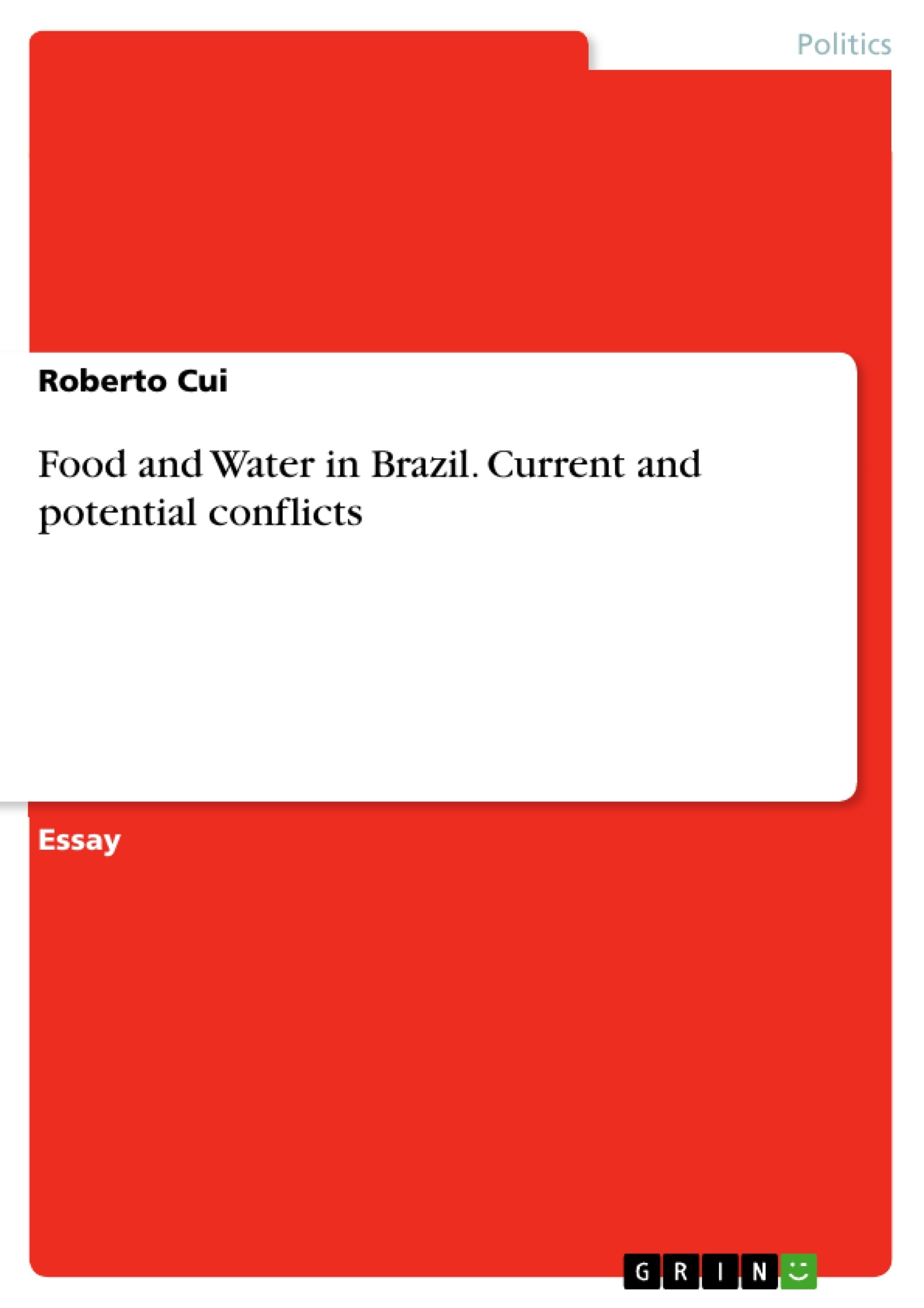Recently, Brazil registered one of the fastest economy growth rates in the world: in 2010, its GDP annual growth was of 7.5%. Despite a remarkable reduction of this figure during the following years, forecasts predict that the recovery will take place within few years. This rapid economic growth translates in an increasing stress on the numerous natural resources, in one of the world’s wealthiest countries from this point of view. As an example, Brazil is the richest country in the world as regards water. Consequently, the country will probably face a major challenge in counter-balancing the fast GDP growth with the sustainability concept and the integrated management of major development installations.
This paper aims to study the current and potential future conflictual impacts of the Brazilian development strategies, in two different areas: firstly, the analysis of the consequences on food and land security will be carried out by focusing on the land-grabbing and biofuels themes; secondly, an assessment of the conflicts related to the displacement of indigenous villages in the hydroelectric power plants pre-construction phase will be conducted. Biofuels play an important role also in the growing demand for water in Brazil.
The implications of these developments for the Human Security landscape in the country are directly linked to the overwhelming global theme of Climate Change: Brazil is strongly committed to reduce its GHG emissions, but, as will be seen further, this target often justifies economical choices, agricultural policies and energy strategies which negatively rebound on the local communities who live nearby the development sites, affecting their social lives and livelihoods, as in the case of dams building.
Inhaltsverzeichnis (Table of Contents)
- Introduction
- Food Security and Land-Grabbing
- Facts and ongoing developments
- Analysis
- Water: dropping rights
- Factual situation and recent developments
- The role of biofuels
- Analysis
- Concluding Remarks
- Conclusion
- Sources
Zielsetzung und Themenschwerpunkte (Objectives and Key Themes)
This paper analyzes the current and potential future conflictual impacts of Brazilian development strategies, focusing on the consequences on food and land security related to land-grabbing and biofuels, as well as the conflicts arising from the displacement of indigenous villages during the pre-construction phase of hydroelectric power plants. The paper emphasizes the implications of these developments for Human Security within the context of Climate Change and Brazil's commitment to reducing GHG emissions.
- Food security and land-grabbing in Brazil, focusing on the impact of biofuel production.
- Water security and the displacement of indigenous communities due to hydroelectric power plant development.
- The role of biofuels in Brazil's development strategy and the potential conflicts arising from their production.
- The relationship between climate change, human security, and resource conflicts in Brazil.
- The challenges of balancing economic growth with sustainable development and the integrated management of resources.
Zusammenfassung der Kapitel (Chapter Summaries)
- Introduction: This chapter provides an overview of Brazil's rapid economic growth and its impact on natural resources, particularly water. It introduces the paper's focus on the conflictual impacts of development strategies on food and land security, as well as on the displacement of indigenous communities due to hydroelectric power plant construction. It emphasizes the link between these issues and the global theme of Climate Change.
- Food Security and Land-Grabbing: This chapter examines the growing demand for crops suitable for both food and biofuel production, specifically focusing on the implications of using soy for biofuels. It discusses the potential repercussions of this trend on food security, highlighting the social exclusion that can result from large-scale land conversion for soybean cultivation. The chapter also explores the environmental and social consequences of soy production, citing deforestation in the Amazon rainforest and the impact on indigenous communities.
- Water: Dropping Rights: This chapter analyzes the factual situation and recent developments regarding water security in Brazil. It examines the role of biofuels in the increasing demand for water and investigates the conflicts arising from the displacement of indigenous villages during the pre-construction phase of hydroelectric power plants. The chapter also explores the potential consequences of these developments for the environment and local communities.
Schlüsselwörter (Keywords)
This paper focuses on the interplay between human security, sustainable development, and climate change combating processes in the context of resource conflicts related to food, water, and land in Brazil. Key themes include land-grabbing, biofuels, hydropower, indigenous communities, deforestation, and social justice. The paper explores the tensions between economic growth and environmental sustainability, highlighting the importance of considering the potential social and environmental costs of development strategies.
Frequently Asked Questions
What is the link between Brazil's GDP growth and natural resources?
Rapid economic growth has put increasing stress on natural resources, particularly water, as Brazil is the world's wealthiest country in terms of water availability.
What is 'Land-Grabbing' and how does it relate to biofuels?
Land-grabbing refers to large-scale land acquisitions. In Brazil, it is often driven by the demand for crops like soy to produce biofuels, which can threaten local food security.
How do hydroelectric plants affect indigenous communities in Brazil?
The construction of large dams often leads to the displacement of indigenous villages, affecting their social lives, livelihoods, and access to traditional water rights.
How does climate change policy influence Brazil's development strategies?
Brazil's commitment to reducing GHG emissions often justifies agricultural and energy choices (like dams and biofuels) that can have negative impacts on local communities.
What are the consequences of soy production in the Amazon?
Soy production is linked to deforestation in the Amazon rainforest and the social exclusion of local populations as land is converted for large-scale industrial farming.
- Citation du texte
- Roberto Cui (Auteur), 2014, Food and Water in Brazil. Current and potential conflicts, Munich, GRIN Verlag, https://www.grin.com/document/282683



